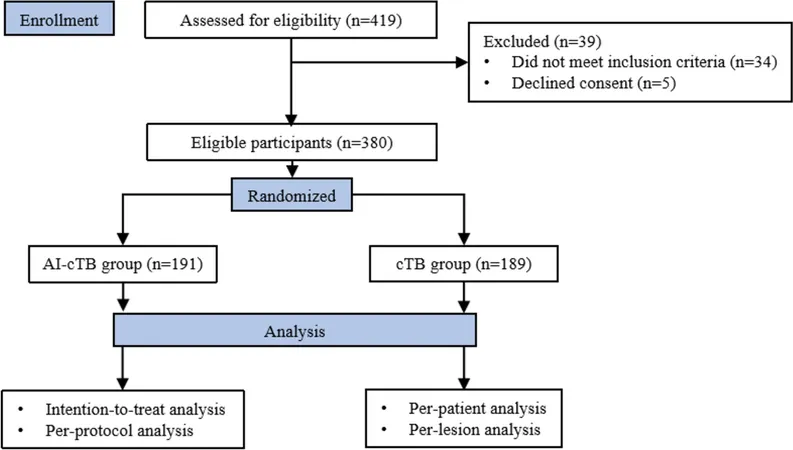
Groundbreaking Trial of 'Memory-Like' Natural Killer Cells Kicks Off at Dana-Farber: Could This Be the Future of Ovarian Cancer Treatment?
2024-11-15
Author: Siti
Introduction
In a groundbreaking development in cancer therapy, the Dana-Farber Cancer Institute has launched a pioneering clinical trial to assess a revolutionary immune cellular therapy targeting recurrent, platinum-resistant ovarian cancer. This study marks one of the first efforts in the United States to investigate the safety, tolerability, and potential efficacy of 'memory-like' natural killer (NK) cells in combating this lethal form of cancer.
What are Natural Killer Cells?
Natural killer cells are crucial components of the immune system, acting as the body’s frontline defenders against infections and malignancies. Unlike T cells, which can remember past infections and multiply significantly when activated, conventional NK cells have limitations in longevity and memory. Researchers have now found a way to enhance these properties.
The Innovative Approach
Led by Dr. Rizwan Romee, the team at Dana-Farber has developed a novel type of NK cell that mimics memory function. This innovative approach allows the modified cells to proliferate and remain effective within the host's body for a longer duration. Preclinical research involving ovarian cancer cell lines and animal models has shown that these memory-like NK cells produce robust anti-tumor responses, raising hopes for their application in patients.
Urgent Need for Effective Therapies
“The need for novel and more effective therapies for patients with recurrent ovarian cancer is urgent,” emphasized Dr. Rebecca Porter, a gynecologic medical oncologist and principal investigator of the study. “Current treatments, particularly immune checkpoint inhibitors, offer limited success, and platinum-resistant ovarian cancer still primarily relies on chemotherapy.” The hope is that this study could illuminate new pathways to revitalize the immune response against tumors that have resisted previous therapies.
Statistics on Epithelial Ovarian Cancer
Epithelial ovarian cancer ranks as the fifth leading cause of cancer-related deaths among women, with most patients diagnosed at advanced stages. The grim statistics reveal a 5-year survival rate of less than 50%, dropping to about 30% for those with advanced manifestations of the disease.
Trial Structure and Design
In the trial, patient-derived NK cells will be harvested and engineered in the lab to enhance their memory-like characteristics before being reintroduced into the patient's body. These empowered cells will be directly infused into the peritoneal cavity, where ovarian tumors are typically located. Additionally, patients will receive chemotherapy simultaneously to create an environment conducive to the activity of the infused NK cells.
Phase 1B Study Details
The phase 1B study aims to enroll 12 to 18 participants, focusing on assessing the safety, tolerability, and maximum tolerated dose of the NK cells. Secondary objectives will explore the efficacy of this innovative treatment. Eligible participants must have undergone at least three previous systemic therapies and be classified as platinum resistant, specifically with high-grade endometrioid or high-grade serous ovarian carcinoma.
Future Directions
Beyond this trial, Dr. Romee's laboratory is exploring even more advanced strategies, aiming to enhance the tumor-fighting capabilities of memory-like NK cells with the incorporation of chimeric antigen receptor technology—a game-changer that could redefine cancer treatments.
Conclusion
“I firmly believe that NK cell-based therapies hold tremendous potential for improving outcomes in patients with advanced ovarian cancer,” Dr. Romee stated confidently. “Moreover, insights gained from this research will be vital for understanding the biological underpinnings of this disease, paving the way for future therapeutic innovations.”
This trial could signify a monumental shift in how we approach the treatment of ovarian cancer, representing hope for thousands of women battling this aggressive disease. As the Dana-Farber Cancer Institute joins the vanguard of cancer research, the world watches eagerly for what could be a dramatic leap toward more effective cancer therapies.


 Brasil (PT)
Brasil (PT)
 Canada (EN)
Canada (EN)
 Chile (ES)
Chile (ES)
 España (ES)
España (ES)
 France (FR)
France (FR)
 Hong Kong (EN)
Hong Kong (EN)
 Italia (IT)
Italia (IT)
 日本 (JA)
日本 (JA)
 Magyarország (HU)
Magyarország (HU)
 Norge (NO)
Norge (NO)
 Polska (PL)
Polska (PL)
 Schweiz (DE)
Schweiz (DE)
 Singapore (EN)
Singapore (EN)
 Sverige (SV)
Sverige (SV)
 Suomi (FI)
Suomi (FI)
 Türkiye (TR)
Türkiye (TR)